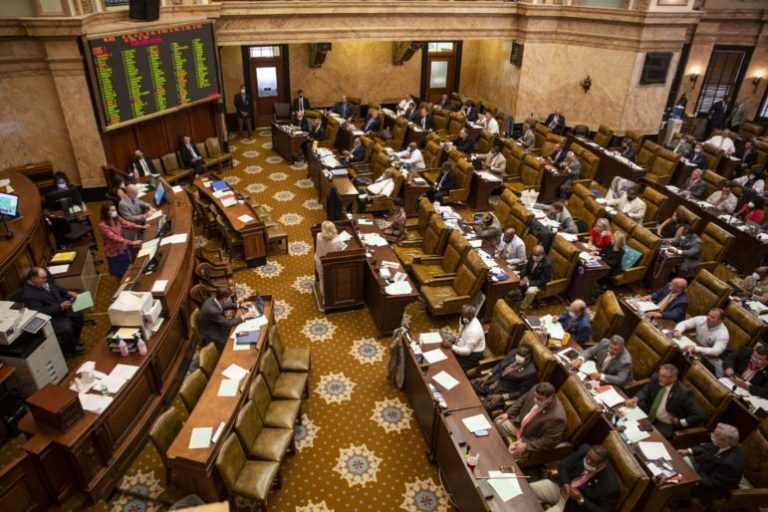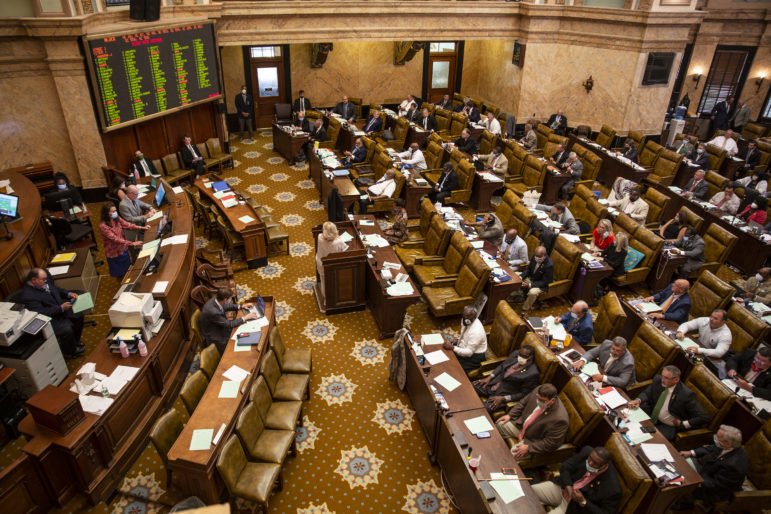

Eric J. Shelton/Mississippi Today
The House of Representatives during the legislative session in Jackson, Miss., Thursday, May 28, 2020.
Before ending their 2020 session – for now – lawmakers late Wednesday night finalized spending $1.25 billion in federal coronavirus relief funds.
The Legislature earmarked the spending for small business grants, internet access in rural areas and computers to help schools provide distance learning in the pandemic, and to reimburse hospitals, cities, colleges and other institutions for pandemic-related expenses.
Gov. Tate Reeves did not immediately respond to a request for comment on Thursday or indicate whether he would sign off on the Legislature’s CARES Act spending.
The Legislature’s earmarking of the funds comes after a heated battle between Reeves and the Legislature over control of the federal coronavirus relief spending. Reeves said that emergency spending should be controlled by the governor, and cited precedent including federal Hurricane Katrina relief. Lawmakers said control of state spending is the constitutional duty of the Legislature.
For now, lawmakers have prevailed. The Legislature’s spending plan passed Wednesday night provides Reeves with $50 million in a “discretionary fund” he will control.
The largest block of CARES Act spending, which lawmakers had already approved in May, is $300 million for small businesses. This spending is well underway, with $240 million going for grants up to $25,000 each for qualified businesses with less than 50 employees. Another $60 million went for quick, emergency grants of $2,000 to about 30,000 small businesses.
“We believe that getting Mississippi’s economy back starts with small businesses,” House Speaker Philip Gunn said of the business grant program. Lt. Gov. Delbert Hosemann noted that Mississippi was one of the first state’s to get CARES Act relief money out to small businesses.
The spending also includes $275 million for expanding rural broadband and helping schools purchase tablets, computers and other hardware for distance learning amid the pandemic.
“This legislation brings connectivity to the world for our children, educators and parents and is a giant leap forward for our state’s future,” Hosemann said Thursday.
Lawmakers directed nearly $182 million of the CARES Act money to the state’s unemployment trust fund, to cover unprecedented payment of unemployment benefits to Mississippians during the pandemic shutdown. Gov. Reeves has warned lawmakers that failure to adequately fill the fund – he estimated about $500 million may be needed – would result in an automatic tax increase to businesses who pay into the fund when they can least afford it.
To address concerns about increased costs for businesses, lawmakers temporarily changed laws so that large unemployment rates caused by the pandemic would not force businesses to pay extra for now.
The CARES Act spending faces a deadline of the end of the year to be spent under federal guidelines. The Legislature included a caveat that any unspent money by late in the year will go to the unemployment trust fund.
For some of the CARES Act earmarks, state contracting and purchasing rules were reduced, to hasten spending the money as “emergency contracts” by the federal deadline. Some lawmakers questioned whether this is a recipe for trouble.
“I understand that falls under emergency spending, and it has to be fast-tracked,” said Rep. Jerry Turner, R-Baldwyn, who has been a champion of contracting and purchasing reform. “But I can tell you, any time you limit accountability and transparency and limit competitive (bidding), there’s an opportunity for misuse. I understand the need for fast-tracking, but I would much rather it be different.”
Sen. John Polk, R-Hattiesburg, another lawmaker who has led contracting reform, was successful in ensuring the CARES spending comes under emergency purchasing regulation, as opposed to being totally exempt from state requirements. Polk said he believes claims that following state purchasing and contracting requirements would slow things down too much to be spurious.
“The way they were initially worded would have allowed any agency head to buy anything they wanted for any price,” Polk said.
A breakdown of the $1.25 billion in CARES Act spending approved by the Legislature:
- Small business grant program: $300 million
- Governor’s discretionary fund: $50 million
- Broadband access: $75 million
- Health care: $129.7 million. This includes $80 million for hospitals, and nearly $50 million for other health providers and nonprofits, including food pantries.
- Mississippi Emergency Management Agency: $40 million
- Cities and counties: $70 million
- Corrections: $20 million
- Tourism: $15 million
- K-12 Distance learning: $150 million
- K-12 Internet connectivity: $50 million
- Universities: $50 million
- Community colleges: $50 million
- Private schools and colleges: $10 million
- Workforce development: $55 million
- Elections: $1 million
- Courts and judiciary: $2.5 million
- Unemployment trust fund: $181.8 million
Lawmakers on Wednesday night also finalized most of a $6 billion state budget. But because of disagreement over spending $52 million in federal Gulf restoration money, they left without passing a budget for the Department of Marine Resources. They are likely to come back into session in coming days to address the DMR budget.
The post Mississippi lawmakers earmark $1.25 billion in CARES money for schools, businesses, health care, unemployment appeared first on Mississippi Today.
- Mississippi Marketplace: data center ups and downs, alcohol shortages and new manufacturing projects - February 19, 2026
- More Mississippi students are graduating despite pandemic-era disruptions, new data shows - February 19, 2026
- Education advocates says Mississippi needs honest, nuanced school choice discussion - February 19, 2026